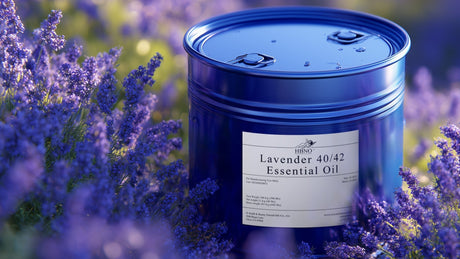Cedarwood essential oil is a staple in natural wellness and perfumery, offering a timeless, woody aroma and one of the best essential oils for scented candles and other applications.. While many types exist, Cedarwood Virginia essential oil is often compared to others for its distinctive scent and characteristics.
This blog explores Cedarwood Virginia essential oil vs other types like Atlas, Himalayan, and Texas cedarwood oils. By comparing aroma profiles, source trees, and typical uses, you'll gain insights into which cedarwood oil best suits your personal or business needs.
Spotlight on Cedarwood Virginia Essential Oil
Botanical Name: Juniperus virginiana Plant Part Used: Wood Origin: Eastern United States Extraction Method: Steam distillation Aroma Profile: Soft, sweet, pencil-like wood scent
Cedarwood Virginia essential oil is derived from the Eastern Red Cedar, a tree native to the southeastern U.S. Despite the name, it's not a true cedar but is part of the juniper family. The oil has a smoother and milder aroma than other cedarwood oils, which makes it a favorite in natural perfumes, candles, and men's grooming products.
It's often included in blends for its ability to round out sharp or citrusy notes with its mellow, grounding base. Because of its mildness, it is also suitable for a wide range of personal care formulations including beard oils, soaps, and body sprays.
Cedarwood Virginia Essential Oil vs Other Types
When exploring cedarwood oil options, comparing Cedarwood Virginia essential oil vs other types highlights key differences in aroma, intensity, origin, and common uses. Below is a breakdown of the primary cedarwood oils available and how they compare:
1. Cedarwood Atlas Essential Oil
Botanical Name: Cedrus atlantica Origin: Morocco and the Atlas Mountains Aroma Profile: Rich, woody, and slightly balsamic
Cedarwood Atlas essential oil comes from a true cedar species native to North Africa. It has a more resinous and deeper scent than Cedarwood Virginia, with a warm, amber-like richness. This oil is commonly used in incense and spiritual blends due to its earthy aroma.
Because of its robust profile, it's ideal for colognes, soaps, and earthy perfumes. Its scent tends to linger longer on the skin and in the air, making it a popular fixative in natural perfumery.
2. Cedarwood Himalayan Essential Oil
Botanical Name: Cedrus deodara Origin: India, Nepal, and the Himalayas Aroma Profile: Smooth, woody, slightly sweet, and creamy
Himalayan Cedarwood Essential oil is another true cedar variety. Its scent is sweeter and more refined than Atlas cedar, with a soft creamy quality. It is often used in spiritual and meditative practices, incense, and woodsy fragrance blends.
This oil is typically included in perfumery and body care products where a subtle, serene wood base note is needed. Its aroma blends well with florals, citrus, and spices.
3. Cedarwood Texas Essential Oil
Botanical Name: Juniperus ashei Origin: Southwestern United States Aroma Profile: Dry, smoky, and slightly sharp
Cedarwood Texas Essential Oil, like Virginia, comes from the juniper family rather than a true cedar. However, its scent is drier and smokier, with a more rugged profile. It's often used in masculine blends, outdoor-themed candles, and household sprays.
This variety is especially valued in soaps, deodorants, and insect-repelling sprays, thanks to its bold scent and versatile blending potential. It shares many qualities with Cedarwood Virginia but has a more intense aromatic presence.

Quick Comparison Table
|
Feature |
Cedarwood Virginia |
Cedarwood Atlas |
Cedarwood Himalayan |
Cedarwood Texas |
|
Botanical Name |
Juniperus virginiana |
Cedrus atlantica |
Cedrus deodara |
Juniperus ashei |
|
Tree Family |
Juniper |
True cedar |
True cedar |
Juniper |
|
Origin |
Eastern USA |
Morocco, North Africa |
India, Nepal, Himalayas |
Southwestern USA |
|
Scent Profile |
Sweet, woody, pencil-like |
Rich, resinous, balsamic |
Smooth, sweet, creamy |
Dry, smoky, bold |
|
Common Uses |
Perfume, candles, skincare |
Colognes, incense, soap |
Meditation, perfumes |
Deodorants, beard oils |
|
Intensity |
Mild |
Strong |
Moderate |
Moderate-strong |
|
Perfumery Role |
Base note, soft fixative |
Base note, strong fixative |
Base note, light fixative |
Base note, rustic fixative |
Cedarwood Oil in Blending and Applications
Across all varieties, cedarwood oil functions well as a base note in fragrance compositions. Its grounding, woody aroma makes it an ideal component in:
-
Essential oil diffuser blends
-
Beard and hair products
-
Candles and wax melts
-
Natural deodorants
-
Soaps and bath products
-
Room Fresheners and linen mists
Cedarwood Virginia essential oil is especially popular in personal care because of its soft, non-overpowering scent. Cedarwood Atlas and Himalayan are often used in spiritual blends and perfumery. Cedarwood Texas brings a smoky edge that pairs well with masculine and forest-inspired fragrances.
How to Choose the Right Cedarwood Oil
When deciding between Cedarwood Virginia essential oil vs other types, here are a few factors to consider:
-
Scent Preference: If you prefer a softer and sweeter wood scent, Cedarwood Virginia is a great option. For a deeper, resinous aroma, choose Atlas. For sweet and creamy notes, go with Himalayan. For rugged, smoky vibes, try Texas.
-
Application Type: For skin care or beard oils, Cedarwood Virginia is often the most gentle. Atlas is well-suited for strong perfumes and incense, while Himalayan is perfect for blends with a spiritual or meditative intent.
-
Blending Goals: All cedarwood oils serve as excellent base notes in essential oil blending. Cedarwood Virginia works well with lavender, citrus, or floral oils. Atlas pairs beautifully with frankincense, patchouli, and spice oils.
Final Thoughts
Cedarwood essential oil comes in various types, each with its own unique aroma and application. Cedarwood Virginia stands out for its soft scent, versatility, and gentle presence in blends.
Whether you're creating candles, personal care products, or exploring natural fragrances, there's a cedarwood oil to suit every need-available in HBNO bulk.




